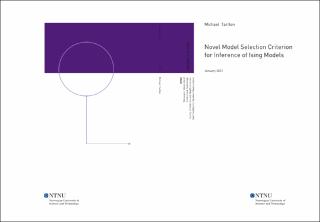| dc.description.abstract | In this thesis we evaluate the performance of the novel Model Selection criteria proposed in Bulso et al. 2019, for inference of network topologies. To this purpose, we consider networks of binary nodes whose probability of activation is modelled by Ising models and generate data by simulating the network dynamics. After which, we infer the network topology by implementing the proposed criterion in a Bayesian model selection framework and compare the inferred topology with the ground truth model. The performance of the proposed method in recovering the network structure is contrasted with that of other popular model selection criteria in varied configurations of Ising parameters, network topologies, and sample size.
We begin by introducing the Equilibrium Ising model and proceed by describing the approximate solutions for making inferences in Ising models. The novel criteria is one of a class of selection methods adapting concepts from information theory, namely the Minimum Description Length. We will also discuss the nonscientific applications and parallels suitable to our approach.
Our results reinforce those found in Bulso et al. 2019. The novel criteria performs similarly to other selection criteria in the experiment regimes tested, with certain exceptions that will be addressed. Unique behaviors identified in the larger regimes may propose further avenues of investigation in networks of larger size and diversity. | |
